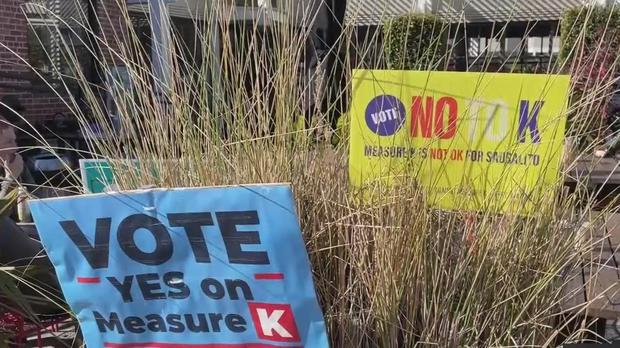Some argue Sausalito’s Measure K would allow cannabis dispensary to have monopoly
SAUSALITO — Frustrated by delays, a cannabis company has put Measure K on the Sausalito ballot that would allow them — and some argue only them — to operate a dispensary in the town.
The measure raises a quetion: Is it democracy in action or an abuse of the initiative process?
CBS
Drive down Sausalito’s main drag and you see signs both for and against Measure K. It is the political race people in this Marin County town are watching closely. Conor Johnston helped write the initiative.
“When we collected signatures, we said to people, ‘This is an opportunity to vote on whether or not Sausalito should have a cannabis dispensary and a delivery company,'” he explained.
Johnston is co-owner of a cannabis company called Otter Brand, LLC. He said he got frustrated by how long it is taking cities to adopt cannabis sales rules. Even a city like Sausalito that voted 77% in favor of statewide legalization six years ago.
“Local municipalities have not approved regulated outlets, so you don’t have regulated grows, you don’t have regulated stores,” he said. “And as a consequence, you have an illicit market.”
But opponents say Measure K goes way beyond just getting the retail cannabis ball rolling. They claim the initiative tailors specific vendor qualifications to match Otter Brand, LLC exactly, making the company the only one eligible to operate the city’s sole dispensary.
Among the requirements outlined in the measure’s language are that at least one operator of the dispensary must live in Sausalito and that the dispensary owners must have experience running a business in the town.
Measure K opponent Alison Behr thinks the whole thing stinks.
“A monopoly is a monopoly,” Behr said. “There’s a reason why we don’t support and allow monopolies in our country. So all the reasons why monopolies are wrong for our country is why Measure K is wrong for our town.”
In its 14-pages, Measure K lays out exactly, in detail, how the dispensary must operate. Councilmember Ian Sobieski said that’s dangerous, because it would lock in one company’s business model as a matter of law.
“The reason we have local government is to react to the details of problems and their solutions,” Sobieski said. “Measure K lays out all the details about how retail cannabis business will be executed, and they can only be changed by another ballot initiative.”
Recreational cannabis was legalized state-wide in 2016 by Proposition 64, but it gave local governments control of its implementation. So each jurisdiction can develop their own rules. Many have been slow to do that.
Johnston dismisses the opposition to Measure K as simply a small group of people who want to prohibit all cannabis in the city.
“That doesn’t necessarily reflect the majority, or even a large portion of the electorate,” he said. “There is always that loud, ‘reefer madness’ contingent.”
But Behr denies that.
“It is not a battle about cannabis at all,” she argued. “It’s a battle about having a monopoly, versus a democratic process to determine what type of approach we could or should have on retail cannabis in our town.”
John Ramos
No Byline Policy
Editorial Guidelines
Corrections Policy
Source

